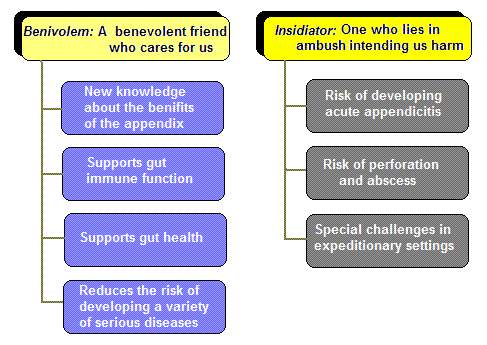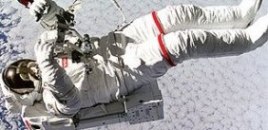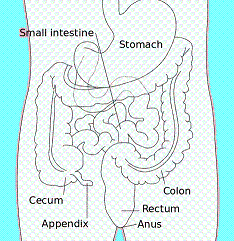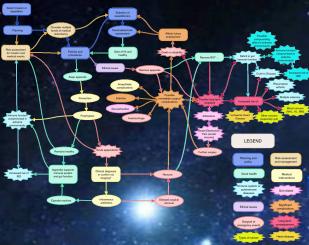
Dr Rowena Christiansen
The Melbourne Medical School and Ormond College
University of Melbourne
< rchr@unimelb.edu.au >
INTRODUCTION
Acute appendicitis is not one of NASA's '33 key risks to human health and performance in space', but the utility of prophylactic appendicectomy in long-duration spaceflight has been raised. There are Antarctic parallels, being required at times, and still in place for wintering Australian doctors.
However, with recent advances in research it is no longer possible to accept the proposition of being "better off without an appendix", or to ignore the ethical issues around the compulsory surgical removal of a perfectly healthy organ and whether this could result in harm to the expeditioner.

1 MISSION PLANNING, POLICIES AND PROCEDURES
Mission Planning is complex, and risk assessments will include both general mission and medical/health risks.
The relevant policies and procedures should ideally address issues such as medical resourcing, training and functional redundancy, selection of expeditioners, and the provision of personalised risk assessments (differing health risks depending on age, gender, and genetics).
There should also be a robust consideration of the ethical issues around any requirement for pre expedition prophylactic appendicectomy (or other surgery), such as:
 |
 |
 |
2 PREVENTION AND NON-SURGICAL PROPHYLAXIS
Further understanding is required as to the causes, prediction and prevention of appendicitis, and the development of individualised risk profiling. There are certainly suggestions in the literature that both immunodeficiency (. in extreme environments) and ‘the hygiene hypothesis’ can play a role in the development of appendicitis. Perhaps the gut microbiome (. in extreme environments) and the risk of developing appendicitis may also be related.
The utility of prophylaxis, such as dietary interventions, prebiotics, probiotics, Vitamin D, or antibiotics (problematic) is currently unclear.
Studies have found that environmental stressors (including ones found in extreme environments) can contribute to the development of inflammatory bowel disease. Further research is needed to determine whether this is also applicable to expeditioners living and working in extreme environments.

3 APPENDICEAL FUNCTION AND IMMUNE SYSTEM FACTORS
 |
The function of the human immune system is
impaired in extreme environments (and during
training beforehand). The “Risk of Adverse Health
Event Due to Altered Immune Response” is one of
NASA’s 33 key human health and performance risks.
How is this relevant to the human appendix?
Long thought to be vestigial, or useless, research (starting back in the mid 1970s) is increasingly showing that the appendix is an important part of the gut immune system. |
So what are the key findings?
Your appendix is useful after all, and potentially additionally so in an extreme environment.
4 DIAGNOSIS OF APPENDICITIS AND OPERATIVE VS NON-OPERATIVE MANAGEMENT
Appendicitis means ‘an inflamed appendix’, and is commonly diagnosed through a combination of history taking, physical examination, and use of scoring systems and algorithms. Laboratory tests and imaging (e.g. ultrasound or CAT scan) can also be useful. Some cases will spontaneously resolve. Proven management options include antibiotics, appendicectomy, percutaneous abdominal drainage for abscesses, antibiotics plus delayed appendicectomy, etc. Remoteness limits access to investigations and surgery becomes more challenging. It is a matter of concern that a significant proportion of appendices removed for suspected appendicitis are structurally normal.
5 PROPHYLACTIC SURGERY: RISKS AND (Surgical Complication) CONSEQUENCES
Harking back to ethical considerations and the risk of harm, both surgery under anaesthetic and loss of the immuno protective role of the appendix (along with any expeditionary immuno supression) present potential risks.
The high rates of ‘negative appendicectomies’ allow research findings concerning surgical complications to be extrapolated to ‘prophylactic appendicectomies’. Based on a 2014 Swedish study, 1:4 to 1:3 patients will experience some sort of complication. The broad range includes infection, death or disability. Complications can occur across a short to medium to long term timeframe; potentially with lifestyle and employment implications.
6 PROPHYLACTIC SURGERY: RISKS AND (Long Term) CONSEQUENCES
After appendicectomy there is a life long risk of abdominal adhesions and the occurrence of small bowel obstruction. This very issue almost scuttled Canadian astronaut Chris Hadfield’s memorable ISS mission. However, this is not the only concern. Accumulating research also shows that there is an increased risk of developing a number of serious chronic diseases, including Clostridium difficile infection, Crohn’s disease, irritable bowel syndrome, ischaemic heart disease, lymphoma/leukaemia/myeloma, multiple sclerosis, breast, oesophageal, stomach or colon cancer, pulmonary tuberculosis, rheumatoid arthritis, Type 2 Diabetes, and venous thromboembolism.
CONCLUSIONS
Managing the risk of appendicitis in a missionary context is a complex issue, and the risk benefit profile for differing management approaches will vary depending on a number of factors. However, important considerations include:
These research findings have implications not only for expedition medicine, but also for medical practice generally and for health economics, e.g.,

Benivolem aut insidiator? There is certainly mounting evidence to suggest that, as a general rule, the appendix does us more good than harm, and its removal should not be taken lightly. Perhaps it is time for a ‘paradigm shift’ where we first reach for antibiotics rather than a scalpel.
REFERENCES AND FURTHER INFORMATION
A full copy of the project report, including references, the further research issues for each section, and the literature review publications database is available on request from: <rchr@unimelb.edu.au>.

 Australian Space Academy
Australian Space Academy